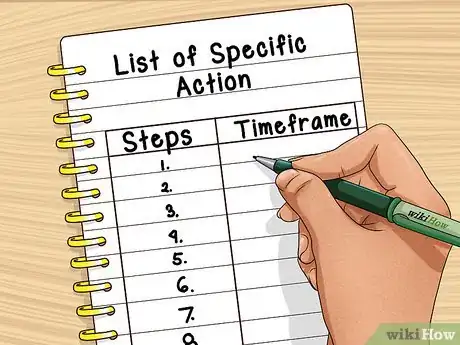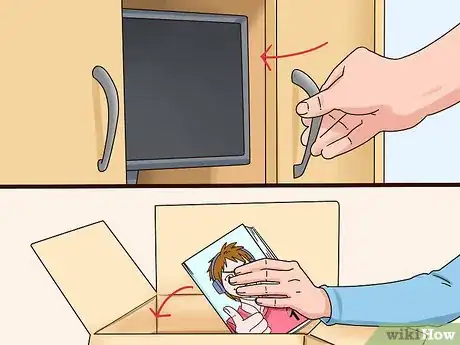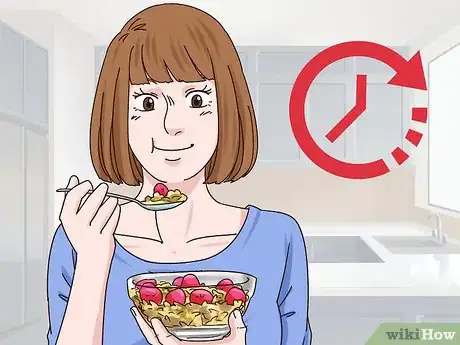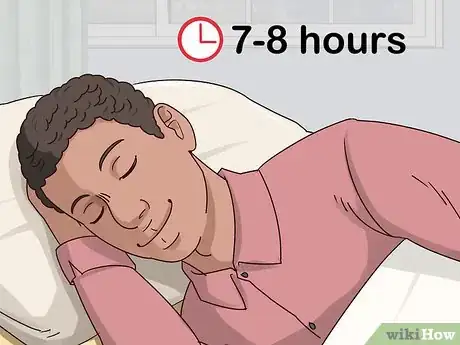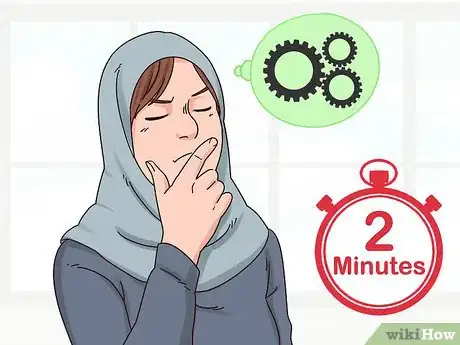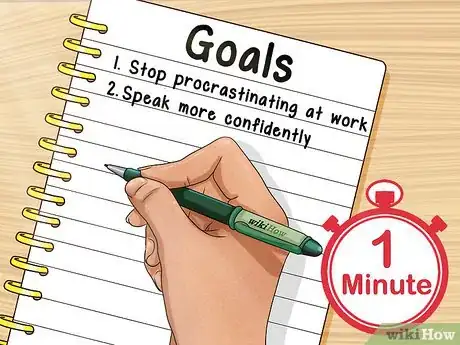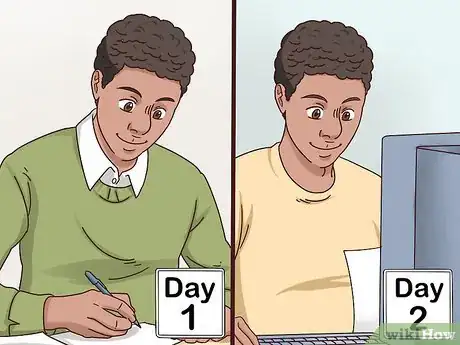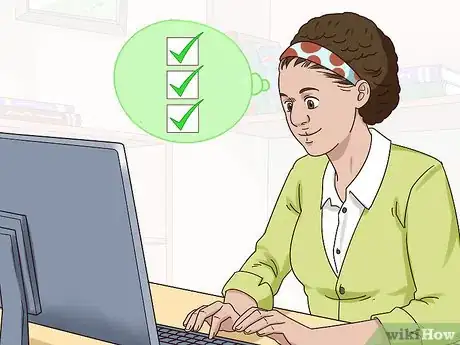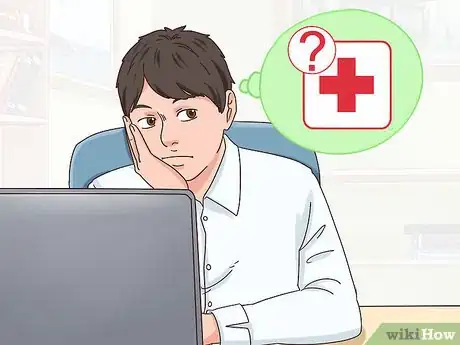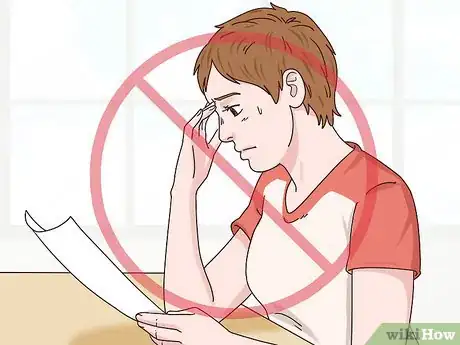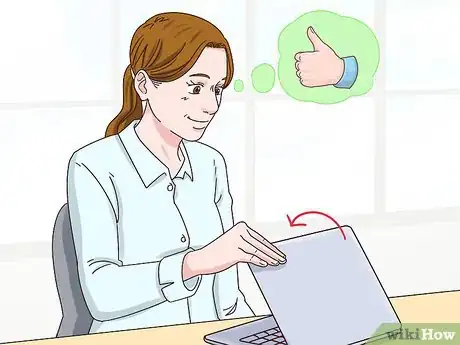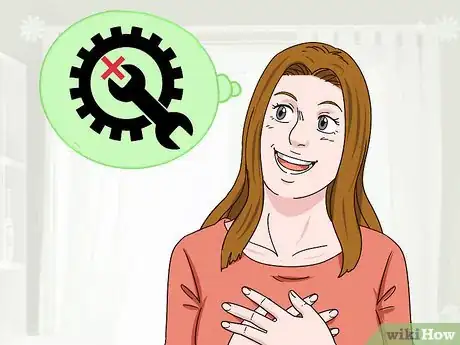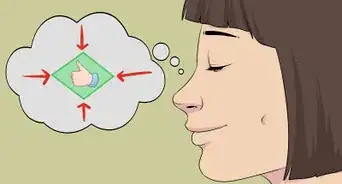This article was co-authored by Julia Lyubchenko, MS, MA. Julia Lyubchenko is an Adult Counselor and a Hypnotherapist based in Los Angeles, California. Running a practice called Therapy Under Hypnosis, Julia has over eight years of counseling and therapy experience, specializing in resolving emotional and behavioral problems. She has a Certificate in Clinical Hypnosis from the Bosurgi Method School and is certified in Psychodynamic Psychotherapy and Hypnotherapy. She earned an MA in Counseling Psychology and Marriage and Family Therapy from Alliant International University and an MSc in Developmental and Child Psychology from Moscow State University.
There are 17 references cited in this article, which can be found at the bottom of the page.
This article has been viewed 37,752 times.
Have you ever wished that you had more willpower, or that you didn’t second-guess yourself so much? Sticking to a decision is often harder than making it in the first place. If you’re tired of feeling wishy-washy, you can follow through on your decisions better by strengthening your willpower and boosting your mental commitment. You can also take a look at your decision-making process and make sure your choices are worth sticking to.
Steps
Boosting Your Willpower
-
1Make a step-by-step plan. Write down a list of specific action steps you can take to follow through on your decision. Then make a timeframe for when you’ll take each step.[1]
- For instance, if you’ve decided to go back to college, your action steps might include finishing your application and sending your transcripts by the application deadline.
-
2Eliminate distractions. Get rid of things that interfere with your follow-through. If you know that certain things tend to distract or tempt you, get rid of them. Replace them with things that will help you stick to your decision.[2]
- For example, if you have set a goal to complete your homework everyday, prioritize doing your homework as soon as you get home. To prevent distraction, place items like your PlayStation, tablet, or phone out of sight. Designate a space for completing your homework and be sure that you have all of your supplies to make getting homework done a success by keeping only your textbooks, pencils, and notebooks on your desk.
Advertisement -
3Eat at regular intervals. Keep your blood sugar and energy levels steady by eating healthy meals and snacks throughout the day. Choose foods that provide a slow release of energy, like whole grains.
- Some researchers think that willpower uses up glucose. This could explain why people make more questionable decisions when they’re hungry.[3]
- Snacks are a great way to keep energy up between meals. Go for healthy but convenient choices like apples, cheese sticks, or a handful of nuts.
-
4Get enough rest. It’s harder to stick to a course of action when you’re tired, overworked, and grouchy. Avoid this by getting enough sleep and pacing yourself as you work. Aim to get 7 to 9 hours of sleep every night, and take short breaks at regular intervals during the day.[4]
- Practice good sleep hygiene by shutting down electronics at least an hour before bed. Do something relaxing, like taking a warm bath or shower or listening to soothing music. Shut off all the lights in your room and lower the temperature to sleep most comfortably.
-
5Make a two-minute commitment to the task or activity. If you’re feeling overwhelmed, follow the two-minute rule. Do whatever it takes to stick to your decision for just two minutes. After that, you can stop if you want to – but you’ll probably find that you want to keep going.[5]
- For example, if you’ve decided to start running, you can get out the door more easily by telling yourself you can turn around after two minutes.
Staying Committed
-
1Remember what you want to achieve. Remind yourself of all the ways you hope your life will improve by sticking to a particular decision.[6] Try making a list and putting it somewhere you’ll see it often. You can also take a minute to write down your goals every morning.[7]
- For instance, maybe you want to stop procrastinating so you’re less stressed at work. Make a list of ways this will benefit you, like speaking up more confidently in meetings, and put it on your office wall.
-
2Focus on one decision at a time. Be realistic: you probably can’t overhaul your whole life at once. Pick just one important decision, and follow through on it before you start working on something else.[8]
- For instance, if you’re trying to decide between two jobs, hold off on making any other important choices until after you’ve accepted one.
-
3Give yourself a pep talk. If your motivation is fading, revive it by talking to yourself. Tell yourself how happy you’ll be if you follow through with your decision, and remind yourself of your qualities that will help you persevere.[9]
- Talk to yourself in the second person. For instance, tell yourself, “You’ve done tough things before, and you can do this too.”
- If you find talking to yourself too cheesy, imagine you’re advising a friend in your position.
-
4Be accountable. Don’t keep your decision to yourself – tell others about it. You’ll be less likely to give up or change your mind if other people are asking about your progress. Better still, find a buddy who will help keep you on track.[10]
- For instance, if you’ve decided to eat healthier lunches, team up with a coworker who wants to do the same thing.
- Remember that life is full of all different kinds of experiences. You can make the best out of any decision.
-
5Make your choices work for you. Stop thinking of your choices as “good,” “bad,” “right,” or “wrong.” That will just leave you doubting yourself at every turn. Instead, focus on how your decisions are allowing you to live the best life you can.[11]
- For instance, if you’re not sure whether you like your new job, focus on the positive aspects of it. Think about what you’re learning and how the experience will prepare you for better jobs in the future.
Making Smart Decisions
-
1Ask yourself if your decisions line up with your values.[12] When you’re considering a big decision, make sure it doesn’t clash with your principles. It’s hard to stick with a choice that makes you uncomfortable or goes against your beliefs.[13]
- For example, if you have been being a couch potato all week long, ask yourself if your behavior is matching what you value (which may be health). If not, then you need to make new decisions and change your behavior. For instance, do exercises while watching TV or get outside for a walk in the fresh air.
-
2Don’t sweat the little things. Some decisions, like the socks you pick out in the morning, just don’t matter in the big picture. Save your mental energy for the choices that do matter, and don’t second-guess yourself over unimportant things.[14]
- Take the pressure off by telling yourself something like, “There’s no wrong decision here.”
-
3Know what you’re looking for. If you’re deciding between several things, figure out what your most important criteria are. When you find an option that satisfies those criteria, choose it. If you try to analyze every single option, you could end up feeling overwhelmed.
- For instance, if you’re shopping for a pair of brown walking shoes, it’s probably best to buy the first pair you like that fits. You’re actually more likely to be unhappy with your choice if you compare it with every other pair of shoes at the store.[15]
-
4Go with your gut. If your intuition is telling you not to do something, trust it. Press pause on decisions you feel weird about, and look for more information in the meantime. Try to reconcile your mind and your intuition before you commit to something.[16]
- Remember that it is enough that something does not feel right to you. You don't have to overthink it.
-
5Avoid gathering too much information. It’s important to be informed, but don’t overdo it. Too much information can distract you from important issues and leave you feeling confused.[17] Learn enough to make an intelligent choice, but don’t get bogged down in the details.[18]
- For instance, if you’re hunting for apartments, you should take cost and location into account. The exact square footage of each apartment probably doesn’t matter so much, though.
-
6Remind yourself that most decisions are reversible. If you realize you’ve made a mistake, you’ll probably be able to fix it. People move to different places, change careers, and alter their habits all the time.[19] Commit to your decisions with the knowledge that few things are completely permanent.[20]
Expert Q&A
Did you know you can get expert answers for this article?
Unlock expert answers by supporting wikiHow
-
QuestionHow do you commit a decision?
 Klare Heston, LCSWKlare Heston is a Licensed Independent Clinical Social Worker based in Cleveland, Ohio. With experience in academic counseling and clinical supervision, Klare received her Master of Social Work from the Virginia Commonwealth University in 1983. She also holds a 2-Year Post-Graduate Certificate from the Gestalt Institute of Cleveland, as well as certification in Family Therapy, Supervision, Mediation, and Trauma Recovery and Treatment (EMDR).
Klare Heston, LCSWKlare Heston is a Licensed Independent Clinical Social Worker based in Cleveland, Ohio. With experience in academic counseling and clinical supervision, Klare received her Master of Social Work from the Virginia Commonwealth University in 1983. She also holds a 2-Year Post-Graduate Certificate from the Gestalt Institute of Cleveland, as well as certification in Family Therapy, Supervision, Mediation, and Trauma Recovery and Treatment (EMDR).
Licensed Social Worker
-
QuestionHow do you make a strong decision?
 Klare Heston, LCSWKlare Heston is a Licensed Independent Clinical Social Worker based in Cleveland, Ohio. With experience in academic counseling and clinical supervision, Klare received her Master of Social Work from the Virginia Commonwealth University in 1983. She also holds a 2-Year Post-Graduate Certificate from the Gestalt Institute of Cleveland, as well as certification in Family Therapy, Supervision, Mediation, and Trauma Recovery and Treatment (EMDR).
Klare Heston, LCSWKlare Heston is a Licensed Independent Clinical Social Worker based in Cleveland, Ohio. With experience in academic counseling and clinical supervision, Klare received her Master of Social Work from the Virginia Commonwealth University in 1983. She also holds a 2-Year Post-Graduate Certificate from the Gestalt Institute of Cleveland, as well as certification in Family Therapy, Supervision, Mediation, and Trauma Recovery and Treatment (EMDR).
Licensed Social Worker
-
QuestionHow can I make the best decision?
 Klare Heston, LCSWKlare Heston is a Licensed Independent Clinical Social Worker based in Cleveland, Ohio. With experience in academic counseling and clinical supervision, Klare received her Master of Social Work from the Virginia Commonwealth University in 1983. She also holds a 2-Year Post-Graduate Certificate from the Gestalt Institute of Cleveland, as well as certification in Family Therapy, Supervision, Mediation, and Trauma Recovery and Treatment (EMDR).
Klare Heston, LCSWKlare Heston is a Licensed Independent Clinical Social Worker based in Cleveland, Ohio. With experience in academic counseling and clinical supervision, Klare received her Master of Social Work from the Virginia Commonwealth University in 1983. She also holds a 2-Year Post-Graduate Certificate from the Gestalt Institute of Cleveland, as well as certification in Family Therapy, Supervision, Mediation, and Trauma Recovery and Treatment (EMDR).
Licensed Social Worker
References
- ↑ https://www.psychologytoday.com/blog/good-thinking/201306/how-boost-your-willpower
- ↑ https://www.forbes.com/sites/amymorin/2014/10/03/6-ways-to-develop-the-self-discipline-necessary-to-reach-your-goals/#49597d032bb1
- ↑ http://www.latimes.com/health/la-he-willpower-20151107-story.html
- ↑ https://www.fastcompany.com/3032513/6-scientifically-proven-ways-to-boost-your-self-control
- ↑ https://www.psychologytoday.com/blog/dont-delay/200803/just-get-started
- ↑ Julia Lyubchenko, MS, MA. Licensed Therapist. Expert Interview. 29 April 2020.
- ↑ http://www.huffingtonpost.com/judith-s-beck-phd/cognitive-behavior-therapy_b_1199790.html
- ↑ http://www.lifehack.org/articles/communication/15-ways-increase-our-willpower.html
- ↑ https://www.fastcompany.com/3034507/5-quick-tricks-to-boost-your-willpower
- ↑ http://www.huffingtonpost.com/alicia/accountability-goals_b_7845608.html
- ↑ https://tinybuddha.com/blog/stop-second-guessing-yourself-5-tips-to-feel-at-ease-with-decisions/
- ↑ Julia Lyubchenko, MS, MA. Licensed Therapist. Expert Interview. 29 April 2020.
- ↑ http://lifehacker.com/5869633/how-to-keep-yourself-from-second-guessing-your-decisions
- ↑ http://www.lifehack.org/articles/featured/5-ways-to-stop-second-guessing-yourself.html
- ↑ http://99u.com/articles/7043/dont-overthink-it-5-tips-for-daily-decision-making
- ↑ https://hbr.org/2015/11/stop-second-guessing-your-decisions-at-work
- ↑ Julia Lyubchenko, MS, MA. Licensed Therapist. Expert Interview. 29 April 2020.
- ↑ https://www.psychologytoday.com/blog/glue/201212/why-too-much-data-disables-your-decision-making
- ↑ Julia Lyubchenko, MS, MA. Licensed Therapist. Expert Interview. 29 April 2020.
- ↑ https://www.inc.com/minda-zetlin/4-tips-to-stop-second-guessing-yourself-yes-really.html
